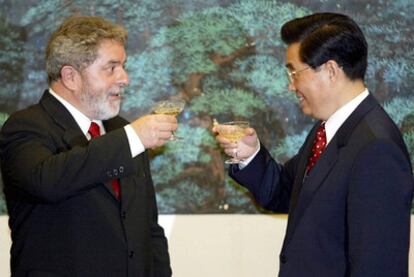Concern grows in Latin America as Chinese businesses move in
Trade officials push to seek mutually beneficial partnership with Beijing
The first decade of the 21st century has seen the emergence of China in Latin America, a region that has grown and weathered the global crisis without too much damage. Among the reasons for this have been booming Latin American sales of oil, minerals and grains to China. But some of the region's officials and businessmen have pointed out the risks of such a partnership with China.
In a recent China-Latin America Business Summit, organized by the Inter-American Development Bank (IDB) and the Chinese government in Chengdu City, the capital of southwest Sichuan province, Brazilian businessman Nizan Guanaes, chief executive of advertising group ABC, described the concerns: "We were colonized once and don't need to be colonized again. We want to be partners."
Latin Americans love money just as much as the Chinese, Guanaes says. But he warns that this complex relationship in which Chinese high-tech exporters sell their products to Latin American manufacturers, its construction companies build public works and its mining and food companies buy up land sites throughout the region isn't a partnership of mutual benefit. Chinese President Hu Jintao has made a couple of trips to Latin America to promote trade and encourage large companies in his country to invest or bid for contracts in the region.
In the middle of the last decade, Chinese companies were ordered to look for outside opportunities, explains Shaobin Yuan, the general manager of Citic Construction, which has won three contracts worth 2.3 billion euros in Latin America. Bilateral trade between China and Latin America in 2000 barely existed, but 10 years later, it has multiplied 11 times.
The Asian giant has become the second biggest trading partner in Latin America, behind the United States and just ahead of the European Union. When Hu first visited the region in 2004, he predicted that bilateral trade would reach 72 billion euros in 2010. And indeed, Chinese investment in Latin America, which up to 2009 amounted to 22 billion euros and accounted for less than one percent of foreign capital in the region, skyrocketed in the first three quarters of 2010 after nine major transactions worth 17 billion euros were announced, including Repsol Brazil's pact with China's state-owned Sinopec.
Of the 19 largest Chinese investments in Latin America announced in 2005, only four were for industry and infrastructure, and the rest for production of raw materials.
"There is concern that we are connecting ourselves to the same export structure we had in the 19th century," says the director of the Economic Commission for Latin America, Osvaldo Rosales, referring to the trade between manufacturers of raw materials that occurred at the time during the British industrial revolution. It is now China that needs these materials to maintain its dominant position in global exports.
Beijing has also sought these raw materials in Africa and that is why companies in Chile, Colombia, Brazil and Argentina are on the alert, according to Juan Gabriel Tokatlian, professor of International Relations at the Universidad Torcuato di Tella in Buenos Aires.
"Chinese companies went to Africa and took their labor techniques, and without respecting environmental standards, adopted a style reminiscent of old colonial policies. But Latin America knows about this dangerous practice and has avoided it so far. The big difference with Africa is the existence of strong political parties, NGOs and trade unions," Tokatlian reasons.
This year, Brazil limited the sale of large estates to foreigners; Uruguay is seeking to prohibit the purchase of land by other countries; and Argentina's Congress is studying a draft law that restricts foreign ownership of fields. All these moves do not mean that Latin American governments are trying to renege on their relationship with China, but instead are adopting a more cautious approach.
"China has the opportunity to demonstrate positive leadership," says Argentinean secretary for international trade Ariel Schale. "We share the idea of growth with social inclusion, but any scenario in which raw materials are the only exports can only undermine this primary objective."
Luiz Fernando Antonio, director of Brazil's international trade office, acknowledges that iron, soybeans and oil account for 80 percent of his country's exports to China. "Meanwhile, we import electronics and computers. We must work together to resolve this," he adds.

Tu suscripción se está usando en otro dispositivo
¿Quieres añadir otro usuario a tu suscripción?
Si continúas leyendo en este dispositivo, no se podrá leer en el otro.
FlechaTu suscripción se está usando en otro dispositivo y solo puedes acceder a EL PAÍS desde un dispositivo a la vez.
Si quieres compartir tu cuenta, cambia tu suscripción a la modalidad Premium, así podrás añadir otro usuario. Cada uno accederá con su propia cuenta de email, lo que os permitirá personalizar vuestra experiencia en EL PAÍS.
¿Tienes una suscripción de empresa? Accede aquí para contratar más cuentas.
En el caso de no saber quién está usando tu cuenta, te recomendamos cambiar tu contraseña aquí.
Si decides continuar compartiendo tu cuenta, este mensaje se mostrará en tu dispositivo y en el de la otra persona que está usando tu cuenta de forma indefinida, afectando a tu experiencia de lectura. Puedes consultar aquí los términos y condiciones de la suscripción digital.








































